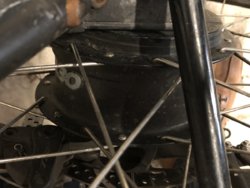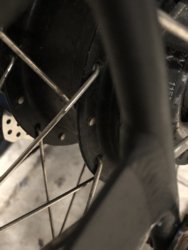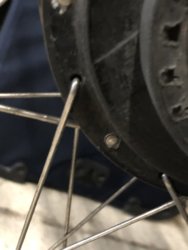annirak
Veteran
- Location
- Cambridge, UK
The spokes on my rear wheel keep breaking. In the first 3 months I had the bike, I broke 4 spokes and got them repaired. When 2 more spokes broke, I had the wheel rebuilt; they used heavy duty stainless steel spokes. 8 months later, I had 6 more broken spokes. Every one of these spokes was broken at the hub side. This time, the LBS rebuilt the wheel with washers at the hub, saying that this would reduce the strain on the spoke heads. I suspect that part of the problem is how the holes on the hub were bored/smoothed.
I have a Nuvinci N330 hubgear, which may be the source of the problems, if the spoke holes have a sharp edge. However, there's a lot of weight applied to that hub: I weigh 75kg, I ride with panniers, and I pull a Weehoo igo Venture, which weighs 13kg and my kid weighs roughly 18kg. Based on the placement of the rear wheel and the child, less than half of (trailer + child = 31kg) is applied as downforce on the rear wheel.
If the washers do the trick, and I don't need another wheel rebuild for another year, then everything is fine. If I need another wheel rebuild within a year, I want to have a plan for how I'm going to fix this more permanently.
As mentioned above, the LBS has put in heavy duty stainless steel spokes and they've used washers at the spoke heads to try and reduce the breakage at the spoke heads. Are there other materials I should consider, rather than stainless steel? Should I be looking for more flexible spokes? What else can I try?
I have a Nuvinci N330 hubgear, which may be the source of the problems, if the spoke holes have a sharp edge. However, there's a lot of weight applied to that hub: I weigh 75kg, I ride with panniers, and I pull a Weehoo igo Venture, which weighs 13kg and my kid weighs roughly 18kg. Based on the placement of the rear wheel and the child, less than half of (trailer + child = 31kg) is applied as downforce on the rear wheel.
If the washers do the trick, and I don't need another wheel rebuild for another year, then everything is fine. If I need another wheel rebuild within a year, I want to have a plan for how I'm going to fix this more permanently.
As mentioned above, the LBS has put in heavy duty stainless steel spokes and they've used washers at the spoke heads to try and reduce the breakage at the spoke heads. Are there other materials I should consider, rather than stainless steel? Should I be looking for more flexible spokes? What else can I try?



